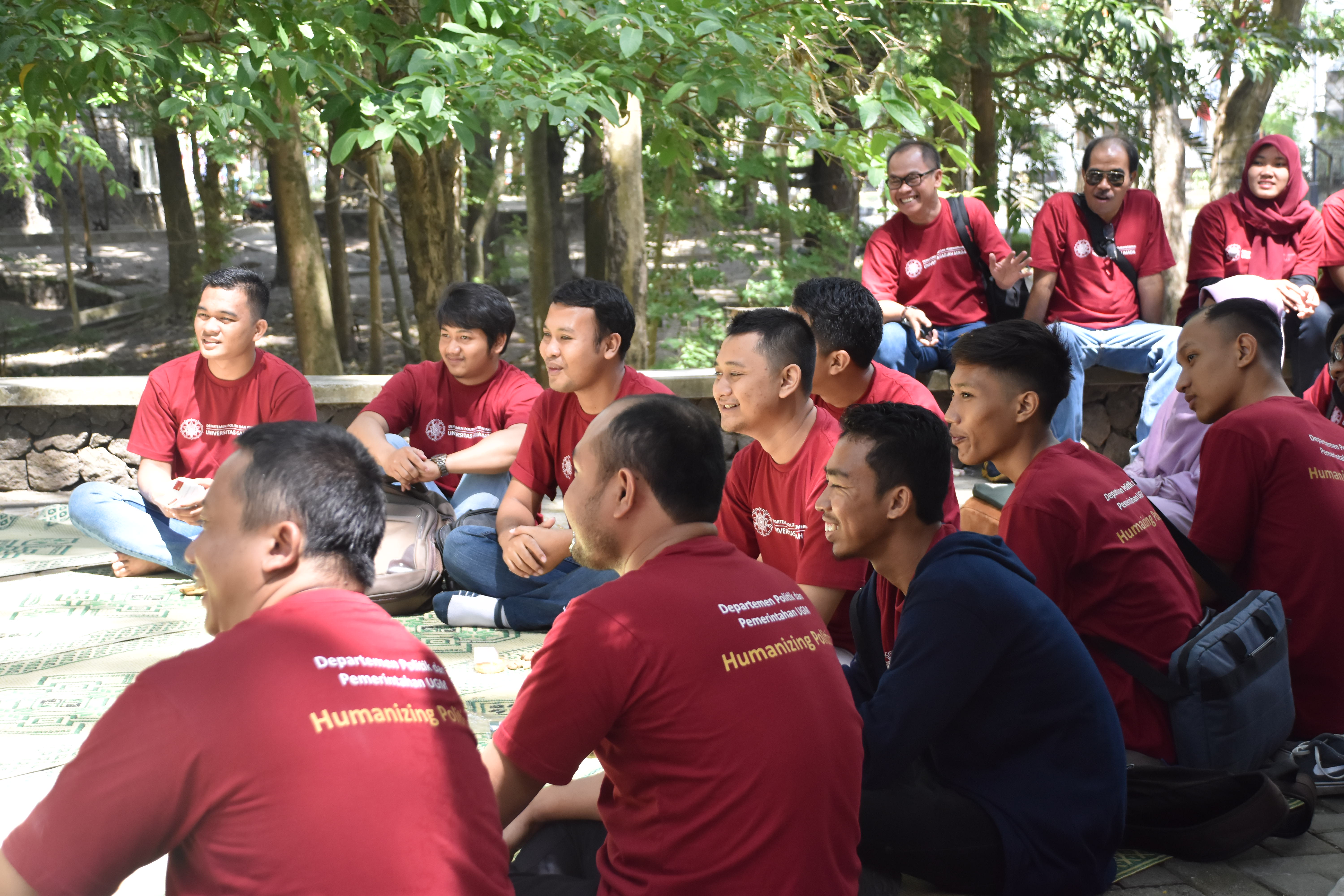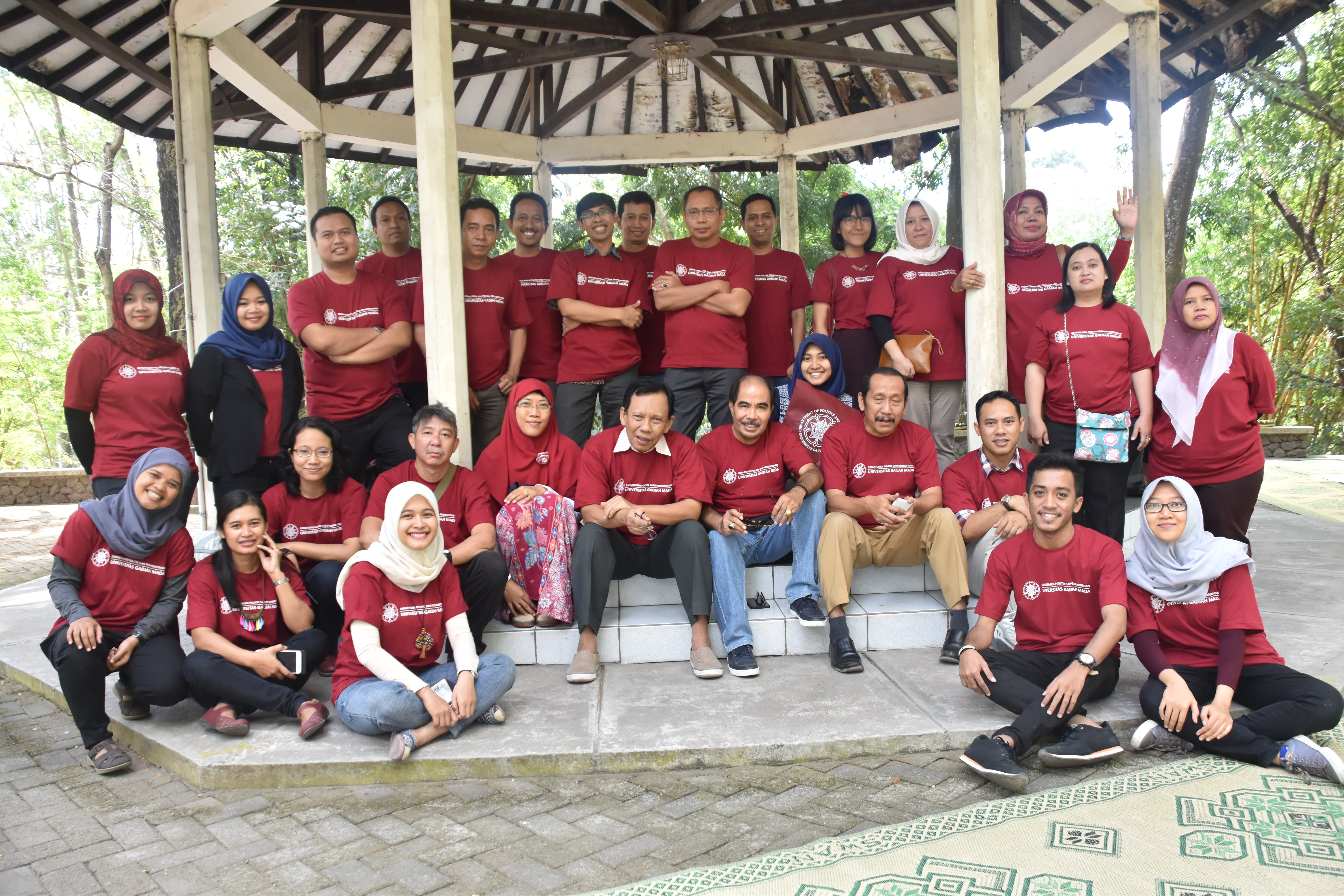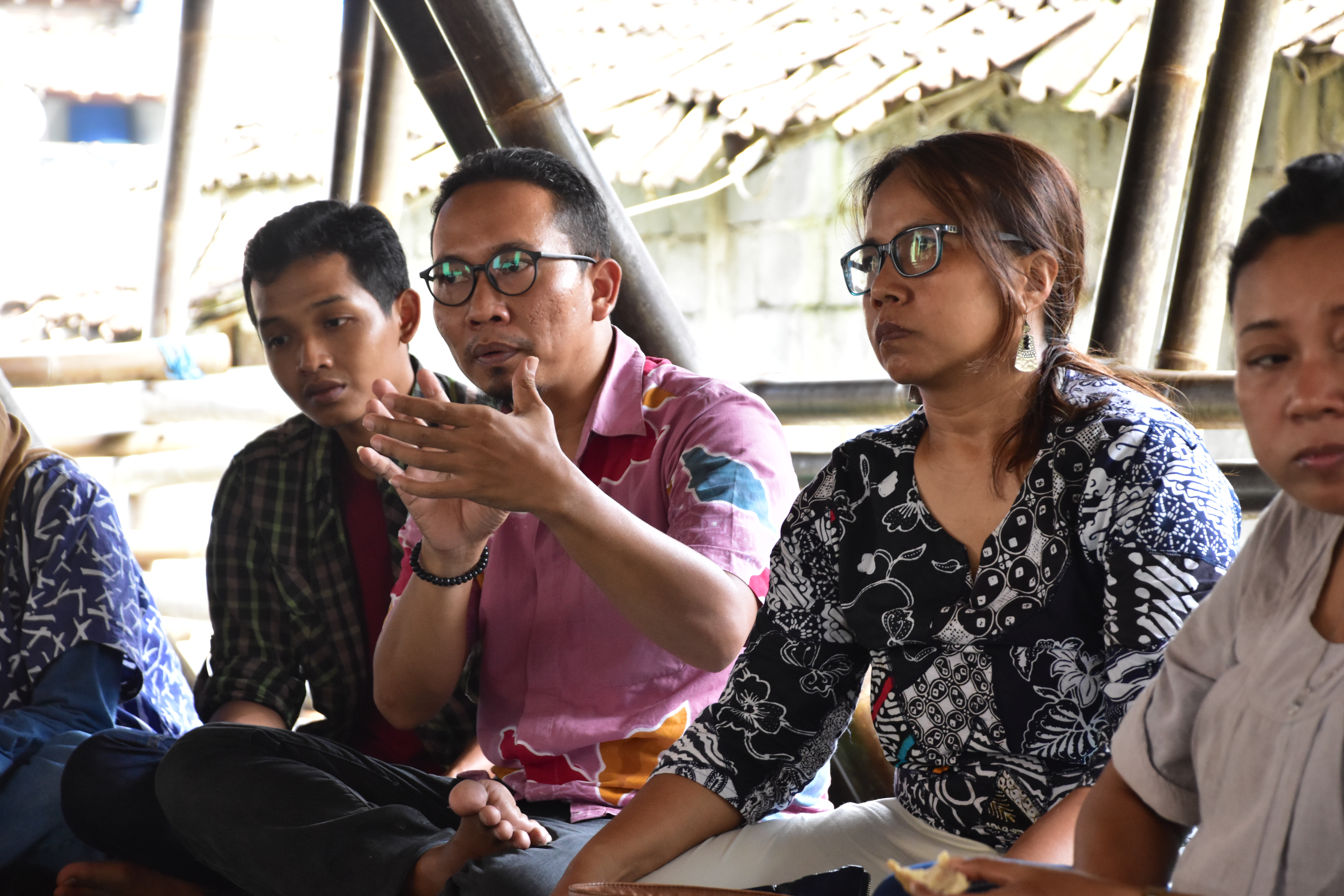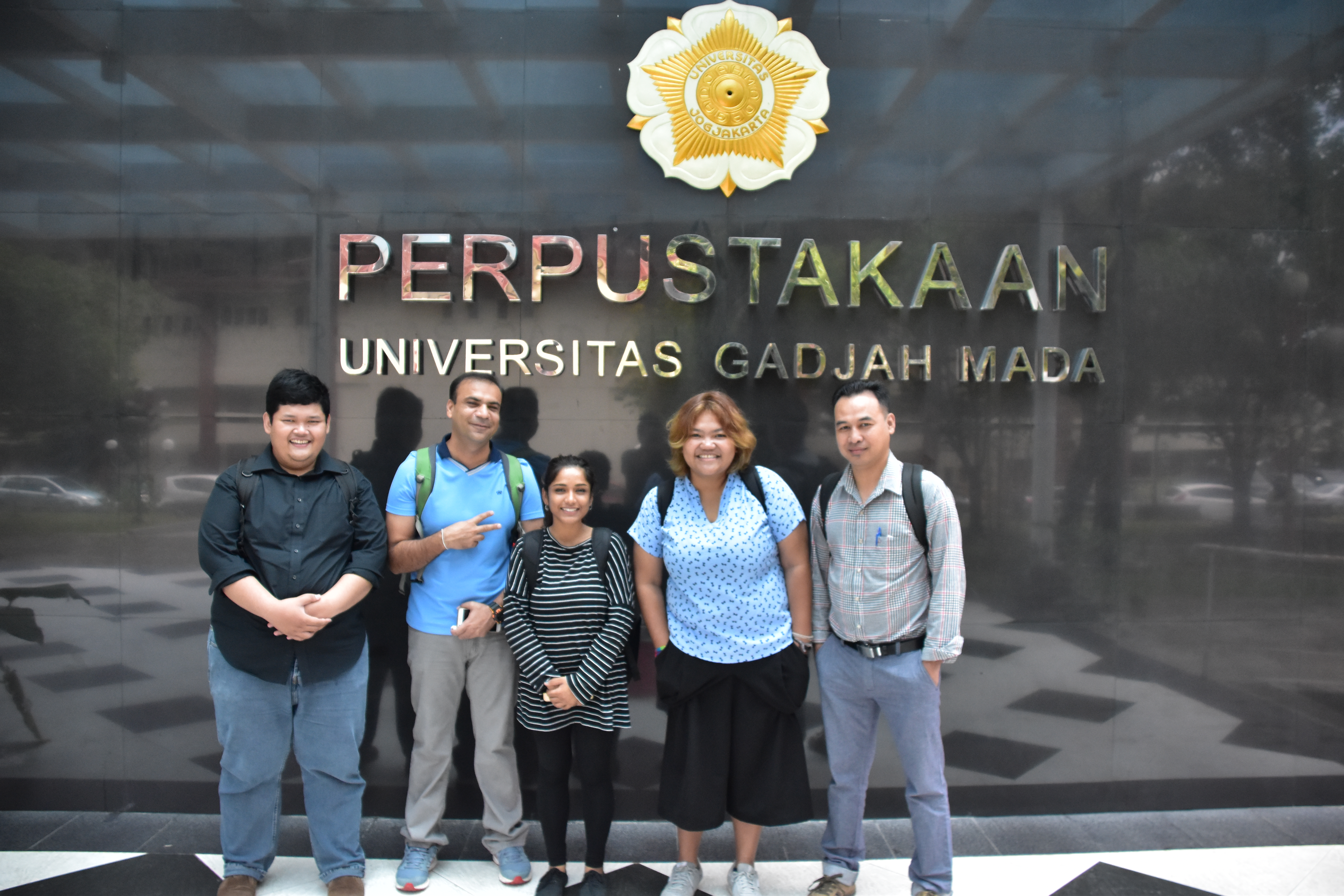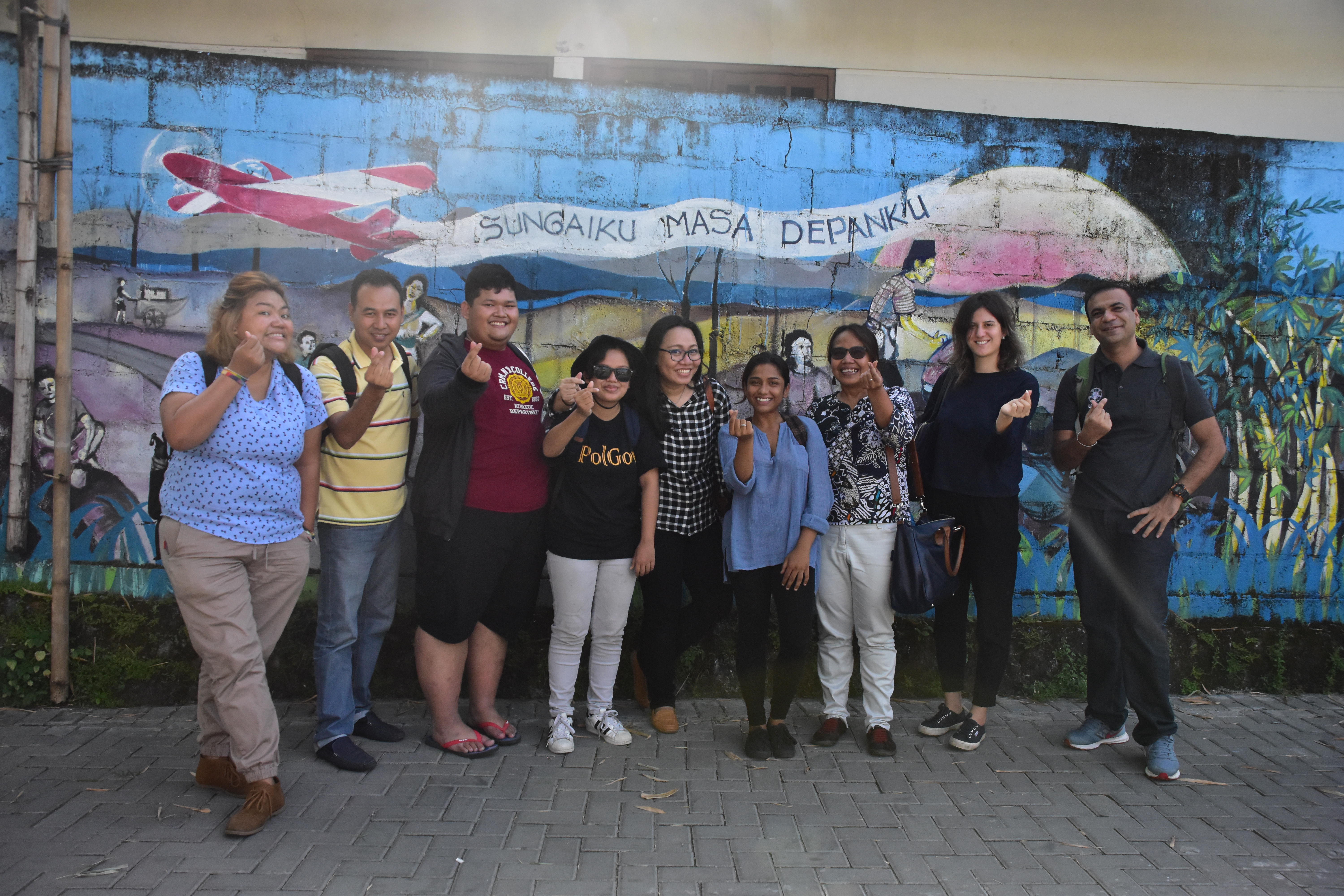POSTGRADUATE PROGRAM / S2
Department of Politics and Government
Faculty of Social and Political Sciences
Universitas Gadjah Mada
Accredited by:

- Curriculum
- Academic Guide
- Student Activities
- Thesis
- Academic Evaluation
- Student Collaboration
- Complaint Service
- Graduation
Courses Concentration
The Masters Program in Politics and Governance at UGM currently offers five scientific concentrations, namely Indonesian Politics, Local Politics and Regional Autonomy, Election Governance, Natural Resources Management, and Human Rights and Democracy.
1. Indonesian Politics
This concentration explores the dynamics of Indonesian politics at the national level. Through this concentration, students are encouraged to understand actors, institutions, mechanisms, and the direction of political change in Indonesia from time to time. Students will learn about a variety of approaches and theories that explain these changes. Analytical competence will be the main dimension that will be developed through this concentration.
2. Local Politics and Regional Autonomy
This concentration aims to encourage students to have strong analytic competencies and to combine them with practical and advocacy competencies that enable students to be actively involved in social change at the local level.
3. Election Governance, Political Party, and Parlement Management
Elections have become an important mechanism in the institutionalization of democracy in Indonesia. Therefore, strong human resources are needed to oversee quality and fair elections. This concentration equips students with analytical and practical competencies by encouraging an understanding of macro and micro aspects of election management. Through a lecture process that involves a more active method, students will also be encouraged to find real solutions for more transparent, accountable, and democratic election management.
4. Human Rights and Democracy
Human rights and democracy have become important global norms that underline every social and political practice. However, as a global norm in practice, human rights and democracy often give rise to new tensions due to variations in social and political contexts. The concentration of Human Rights and Democracy in the MAPG seeks to understand the various perspectives in this area. The focus will be directed not only on the value dimension but also on the institutional aspects and their impact on social and political change. This concentration encourages students to have strong political competence as well as advocacy skills related to democracy and human rights.
5. Natural Resources Management
Almost all political practices cannot be separated from the resource factor, one of which is natural resources. The Natural Resources Management concentration in MAPG invites students to discuss the importance of natural resources in the context of political economy, both locally, nationally and internationally. This concentration discusses how political processes are intertwined with corporate actors for the sake of political economy interests. Not infrequently, the political processes carried out are intermediate goals in order to create extractive economic sustainability in various sectors and actors.
Courses
In first semester, Masters students in the Department of Politics and Government have 6 (six) compulsory courses that must be completed before continuing on to the next semester.
In second semester, Masters students only have 1 (one) compulsory subject, namely Research Methods. In this semester, Masters students are also required to choose 5 (five) courses from 1 (one) concentration only. This means that students in second semester have a total of 6 (six) courses that must be completed to proceed to the next semester.
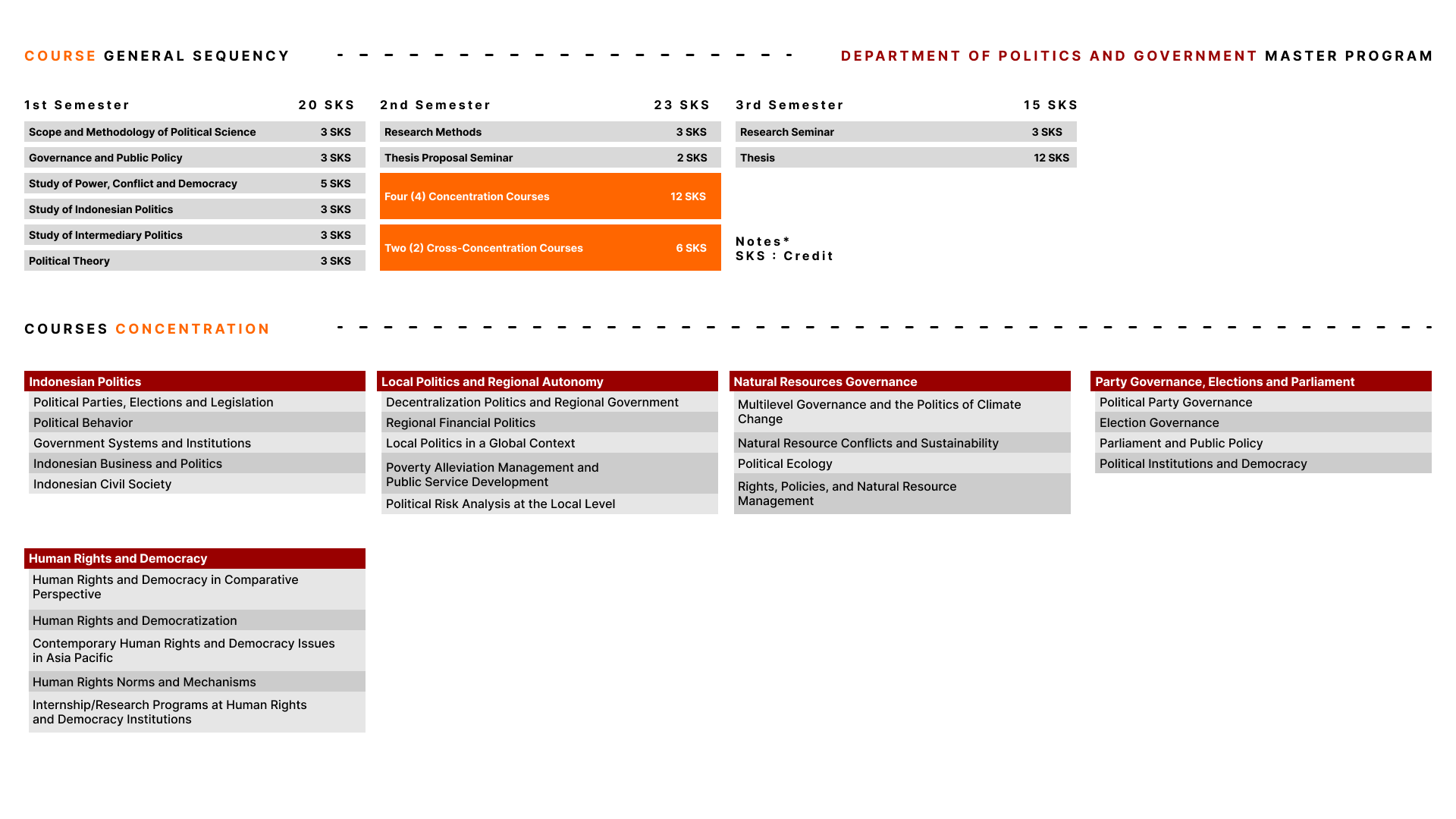
Lectures
Courses Credits
Taking Courses
Every active student is required to take courses in each semester. The process and substance points that include the mechanism for taking courses are contained in the order and mechanism for taking courses as follows:
- Taking courses (KRS Filling) is done after successful register;
- The study program determines the number of credits with a package system consisting of compulsory and optional courses that are offered in the semester that students will run;
- Take the number of courses with a total credit that does not exceed the allotment as regulated by the study program and faculty;
- Taking courses by referring to the study program curriculum guidelines;
- Using Academic Information System (SIA);
- Fill out KRS according to the schedule determined by the faculty;
- Revise KRS at least 1 week before class starts;
- Lectures start at the beginning of the semester, and at the end of the semester the Study Results Card (KHS) will come out in accordance with the KRS that has been filled in.
Course Remedial
Students have the right to repeat courses or take courses that have been taken by the student concerned. To carry out this process, previous students must meet the requirements for the substance of the course repetition mechanism contained in the regulations made by the Faculty. The following is the mechanism for repeating courses:
- Students have the right to repeat courses that get a minimum grade of C;
- Students who get a grade of B or more cannot repeat the course for any reason;
- The final grade for the maximum repeated course is A/B;
- The repetition of a course is a maximum of one time except for compulsory subjects that do not pass.
In addition to taking the entire course again, students are also entitled to take remedial exams; both for the mid-semester and end-semester exams, with the following mechanism:
- Students have the right to remedial if they get a score less than C or do not pass;
- Remedial is done no later than 1 week after the lecture runs in the following semester;
- Students get a maximum value of C if they pass the remedial;
- The remedial results do not affect the number of credits to be taken in the next semester;
- The requirement to be able to take remedial is to have attended lectures at least 75% attendance.
Scoring Complaint
Scoring complaint is adjusted to the learning contract in each course. If there are things that need to be communicated and further confirmed, please contact the lecturer directly. If you don’t get a response from the lecturer in question within two weeks, it can be facilitated by the DPP Master Program Manager
Evaluation and Scoring
Exam
- Exams are held twice in one semester by the Faculty, namely the mid-semester examination (UTS) and the end-semester examination (UAS).
- The form and mechanism of the exam is left to the lecturer in charge of the course which will be delivered at the beginning of the lecture.
- Assessment of learning outcomes is carried out by lecturers which includes accumulated test scores (middle and end of semester), activity in class, assignments, discipline, and academic honesty.
- The determination of the weight of each component is left to the lecturer in charge of the relevant subject.
Scoring Indicator
Students can check their scores in Simaster UGM.
Student Leave
Leave Application
Students are entitled to take academic leave during their study period. The conditions for taking academic leave must follow the following conditions:
- In a state not registered as a Fisipol student (have not paid BOP, SPP or UKT)
- The academic leave period does not exceed (or a maximum of) two cumulative and non-consecutive semesters
- If the requirements are met then leave permission is given by the dean. If not, leave permission is submitted to the Chancellor
- Not entitled to receive academic services (thesis guidance)
- Conditions for applying for leave: a) being actively registered in the previous semester; b) pass a minimum of 36 credits with a minimum GPA of 3.00.
- Leave procedures: a) application letter is submitted to the Dean with the approval of the supervisor and study program manager; b) leave is requested no later than 2 weeks before the re-registration period for the next semester; c) Academic leave is not calculated in relation to study time; d) During the academic leave period, the student concerned is not required to pay tuition fees and other fees.
Re-activation Submission
Students who will re-register after leave, submit:
- The active application letter is returned to the Dean accompanied by the previous semester leave permit.
- An active application letter to the Chancellor for students who have received leave from the Chancellor, attached with the previous permit.
- Students who take academic leave of more than two years, if they are to be active again, must submit an application letter to the Chancellor with a copy to the Dean.
Re-registration after leave
- Students who take academic leave of less than or equal to four semesters and will re-register and carry out academic activities, must meet the following requirements:
- Submit the last student card
- Submit a letter of active study permit again from the dean.
- Submit an academic leave permit.
- Pay tuition fees and other fees in accordance with applicable regulations
Students who take academic leave are required to submit a letter of application to be active again at least one month before the re-registration period for the semester in question.
Lecturers
Lecturers in Postgraduate Program
- Prof. Dr. Haryanto, MA
- Prof. Dr. Purwo Santoso, MA
- Prof. Dr. Pratikno, M. Soc.Sc
- Dr. Ratnawati, SU
- Dr. AAGN Ari Dwipayana, MA
- Dr. Abdul Gaffar Karim, SIP, MA
- Dr. Amalinda Savirani, MA
- Dr. rer. Pol. Mada Sukmajati, SIP, MPP
- Dr. Wawan Mas’udi, MPA
- Dr. Nanang Indra Kurniawan, MPA
- Dr. Bayu Dardias Kurniadi, MA, M.Pub.pol.
- Dr. Evi Lina Sutrisno, MA
- Dr. Arie Ruhyanto, M.Sc
- Dr. Tapiheru Joash Elisha S, MA
- Dr. Hasrul Hanif, M
- Nur Azizah, M. Sc (Ph.D. Candidate)
- Ashari Cahyo Edi, MPA (Ph.D.
Candidate) - Longgina Novadona Bayo, MA (Ph.D.
Candidate) - Ulya Niami Efrina Jamson, MA (Ph.D.
Candidate) - Arya Budi, MA (Ph.D. Candidate)
- Muhammad Djindan, M.Sc (Ph.D.
Candidate)
Fieldtrip
Fieldtrip is specifically for students who take the concentration of Natural Resources.
Guest Lecturer
Some courses in the master’s program invite guest lecturers who are experts in certain subject themes. Guest lecturers are usually present during even semesters to fill several lecture sessions.
Financial Aid
Students can apply for funding assistance proposals for student activities.
Citizen Engagement and Natural Resource Governance Education (CitRes-Edu)
CitRes-Edu is a research-based educational collaboration project between three institutions: Department of Geography, Norwegian University of Science and Technology (NTNU); Department of Politics and Government, Faculty of Social and Political Sciences, Universitas Gadjah Mada (UGM); and the Faculty of Geography, UGM. The main objective of this project is to develop and strengthen research-based educational partnerships that have relevance for post-campus working life between NTNU and UGM. The specific topic the project focuses on is the dynamics between transnational natural resource governance and local community engagement. To achieve this goal, the project has four sub-goals, as follows:
- Implement and institutionalize the concentration of Natural Resources Politics in the Masters Program in Politics and Governance UGM;
- Encouraging internationalization within the UGM Department of Politics and Government, with an emphasis on the concentration of Natural Resources Politics in the master’s program and in the doctoral program in Politics and Government;
- Strengthening the internationalization of the existing master’s program at the Department of Geography, NTNU;
- Develop inclusive education that is open to all.
- One semester coursework at NTNU
- Monthly living expenses, travel expenses, visa cost and insurance
- Financial support for IELTS preparation courses and test
- Fully-funded 2 month extension for thesis writing and consultation if needed
- Fieldtrips to many region of Norway
- Joining the Citizen Engagement, Transparency and Transnational Natural Resources Governance (CitRes) network
Master of Arts in Human Rights and Democratization (APMA MHRD)
- Scholarship coverage
- An opportunity to undertake your master degree in more than 1 country
- A chance to expand your international network
- Knowledge development with human rights practitioners and experts
Final Assignment
Postgraduate students are required to complete their thesis before graduate.
Thesis Guidance
During the lecture process, students will have intense communication with one academic Advisor (DPA). In this mentoring process, students can consult on various matters related to the academic process, such as filling out the KRS, determining the courses to be taken to designing the thesis they want to write. All the mentoring and consultation processes will be monitored in writing through the Academic Progress Monitoring System and Thesis Guidance Progress.
There are several ways that students can use to follow the mechanism of mentoring and consultation with lecturers, namely:
- Follow the schedule of guidance and consultation.
Students can come for consultation according to the specified schedule if the supervisor in question already has a fixed schedule of consultation. - Make an appointment in advance.
If students want to take guidance or conduct academic consultations with supervisors who do not determine a fixed schedule for guidance and consultation, the student concerned can ask for an agreement on the lecturer’s time by making an appointment in advance. In making an appointment, students can directly meet the lecturer in question or contact via telephone or e-mail.
Thesis Defence Requirements
- Scan of Student Identity Card
- Proof of current semester UKT payment
- KRS for the current semester (must include the ‘Thesis’ credit)
- Interim transcript with a minimum GPA of 3.0
- Theory Pass Letter
- Show a photocopy of TPA and TOEFL certificates
- Proof of lecturer’s approval to register for the exam
STUDENT WORKLOAD SURVEI (2024)
The survey aims to capture students’ perceptions of the workload for each course (MK) taken during the 2023 academic year. The survey’s objective is to determine the correlation between the designated course workload and students’ reported experiences. Additionally, it helps the study program assess and understand students’ perceptions of their academic workload in the courses they are taking. Following sections will describe the methods used, present the findings, and discuss the analysis.
Research
Research is an important element in the student learning process, therefore the UGM Department of Politics and Government opens wide opportunities for students to collaborate in research activities carried out by the UGM Department of Politics and Government together with the Research Center for Politics and Government (PolGov). Some of the roles that are actively held by students are enumerators, transcriptors, and guides.
As enumerators, students have the opportunity to go out into the field and conduct interviews with resource persons under the guidance of PolGov researchers. As transcriptors, students are able to substantially participate in discussions and research interview results and write them down in text form to be processed into research data. Then, as a guide, students who have knowledge of research areas will go to the field and participate in a series of research with PolGov researchers.
Publication
In terms of publications, student involvement is wide open in making written works in the form of journals and books. Students can be involved through “Call for Paper” and/or final project submission in the form of a thesis by fulfilling the following conditions:
Call for Paper: UGM PolGov Journal
Writing theme:
- Socio-political movement
- Agrarian-land politics
- Elections and regional head elections
- other themes related to politics and governance in Indonesia
Writing conditions:
- Journal manuscripts must consist of a minimum of 4,000 words
- The manuscript has never been accepted or published in any journal
- The author is able to follow the publishing flow in accordance with the provisions of the PolGov Journal
Thesis
- The thesis of the work made by the author is a thesis in the form of a journal
- Recommended by thesis supervisor to be published in journal form
- Manuscript must be at least 4000 words
- The manuscript has never been accepted or published in any journal
- The author is able to follow the publishing flow in accordance with the provisions of the PolGov Journal
Media
Media is a means of communication between stakeholders within the Department of Politics and Government UGM which is manifested in the form of social media Instagram, Facebook, Twitter, YouTube, TikTok, to spotify “Ministry of Politics and Government UGM”. In its development, the media collaborated with student creativity in course assignments that were accommodated by the “Student Work” segment and collaborated in content creation.
Complaint Service
Students can submit critics, suggestions, and other needs related to the UGM Department of Politics and Government through:
Head of Postgraduate Program
bayudardias@ugm.ac.id (Bayu)
Postgraduate Program Secretariat
+62 811-250-2020 (Enny)
Sexual Violence Hotline
Graduation Requirements
- Upload Thesis
Upload the Thesis PDF file independently via the unggah.etd.ugm.ac.id page - Got Graduation ID
Students ask for passwords and graduation online IDs at the Academic Section of Faculty Office - Filling in Personal Data
Students fill in their personal data after verification - TPA/TOEFL Verification
Students wait for TPA and TOEFL verification by the University a maximum of 1×24 hours - Upload TPA/TOEFL
Students upload scans of TPA and TOEFL certificates through wisuda.ugm.ac.id - Print Graduation Cards
Students print attachments (A.1 to A.5) which have been signed by master students and study programs submit a thesis CD to the FISIPOL library and a free letter from the library - Pay Graduation Fees
- Paying the graduation release fee of IDR 450,000.00
- Number: 888815171266
- Name: UGM FSP KAF WIS S2
- Bank: Bank Mandiri
- Collecting Files
Submit complete graduation documents to the faculty



